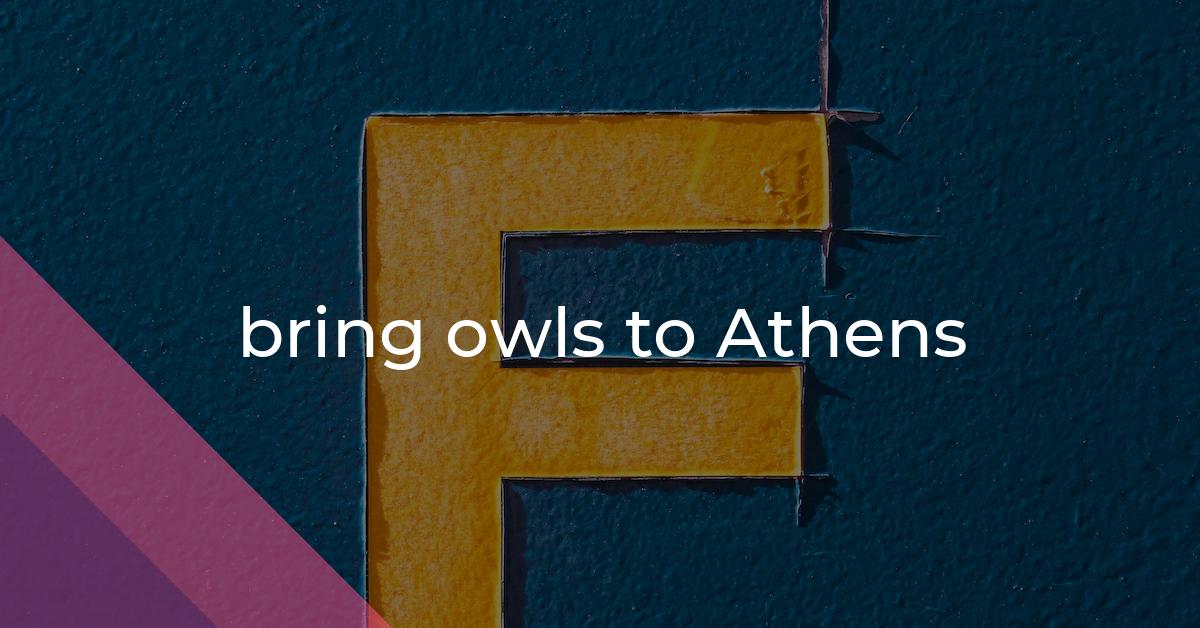bring owls to Athens: Idiom Meaning and Origin
What does ‘bring owls to Athens’ mean?
The idiom "bring owls to Athens" means to bring or introduce something unnecessary or superfluous to a place or situation where it is already abundant or readily available.

Idiom Explorer
The idiom "put the cat among the pigeons" means to do or say something that causes confusion, trouble, or controversy, resulting in a chaotic or unsettled situation.
The idiom "go to the bow-wows" means to deteriorate or decline in a significant way.
The idiom "go out of one's way" means to make an extra effort or to do something that is not required or expected, often to help someone else or to achieve a specific goal.
The idiom "fox in the henhouse" refers to a person or thing that poses a threat or danger by infiltrating a group or situation where they are not welcome or trusted.
The idiom "for the birds" means something is worthless, unimportant, or not serious.
The idiom "fly too close to the sun" refers to the Greek myth of Icarus, who ignored warnings and flew too high, resulting in his downfall. It means to take excessive risks or pursue ambitions without considering the potential consequences.
The idiom "fly in the ointment" refers to a small but significant flaw or issue that spoils something positive or favorable. It symbolizes how even a small problem can greatly detract from the overall enjoyment or success of a situation.
The idiom "feather one's nest" means to accumulate wealth or resources for one's personal benefit, often through cunning or unethical means. It suggests the act of building a comfortable and secure home for oneself by adding more and more feathers to a nest, symbolizing wealth and comfort.
The idiom "come along" means to join in, accompany, or make progress in a particular situation.
The idiom "coals to Newcastle" means doing something redundant or unnecessary, as Newcastle was historically a major producer of coal, making it unnecessary to bring more coal to the city.
Unlikely Endeavor: Wise Intrusion
The idiom "bring owls to Athens" is an expression with its roots in Greek mythology. In ancient Greece, Athens was known as the city of Athena, the goddess of wisdom and the patron goddess of Athens. As the city was already abundant in owls, which were considered the sacred symbols of Athena, the expression "bring owls to Athens" was used to denote a pointless or unnecessary action.
The origin of this idiom can be traced back to the historical accounts of Athenaeus, a Greek rhetorician and grammarian who lived in the 2nd century AD. In his work, "Deipnosophistae," he recounts a story which serves as the earliest known usage of the idiom. According to Athenaeus, when someone asked why he brought another man to Athens, the person responded by saying, "To bring owls to Athens." This highlights the idea that bringing something already abundant to its place of origin is an act devoid of purpose or value.
Over time, the idiom "bring owls to Athens" has become a popular expression in English, conveying the notion of redundancy or superfluity. It is often used to describe situations where something is being brought or done unnecessarily or with little benefit. For example, if someone were to say, "Selling ice cream on a hot summer day is like bringing owls to Athens," they would be emphasizing the pointlessness of the action.
The idiom "put the cat among the pigeons" is another English expression that shares a similar meaning to "bring owls to Athens." It refers to creating a disruptive or chaotic situation by introducing something unexpected or controversial. Just as bringing owls to Athens is considered unnecessary, putting a cat among pigeons serves no constructive purpose and only serves to cause trouble.
The idiom "bring on" is also related to "bring owls to Athens" in that both expressions suggest the unnecessary introduction of something. "Bring on" is commonly used to indicate a desire to experience or encounter something, often with the implication that such an action is unnecessary or ill-advised. In the context of "bring owls to Athens," it can be seen as a warning against inviting or welcoming something that is already abundantly present.
Similarly, the idiom "bring a knife to a gunfight" can be linked to the concept of bringing owls to Athens. Just as bringing owls to a city already known for its owl population is redundant, bringing a knife to a gunfight is an act of folly. It implies that the action or item being brought is inadequate and ill-suited for the situation at hand.
The idiom "carry coals to Newcastle" is yet another expression that conveys a similar message as "bring owls to Athens." It originates from a historical context in which Newcastle upon Tyne in England was renowned for its coal production. Bringing coals to Newcastle, therefore, would be an unnecessary and futile task. The idiom serves as a reminder that certain actions or items are already abundant or readily available in a particular place, rendering any additional efforts redundant.
Lastly, the idiom "bring together" can be contrasted with "bring owls to Athens." While "bring owls to Athens" emphasizes the unnecessary nature of bringing something already present, "bring together" underscores the constructive and valuable act of uniting or assembling. By using this idiom in conjunction with "bring owls to Athens," one can highlight the dichotomy between pointless actions and meaningful ones.
The idiom "bring owls to Athens" has withstood the test of time and continues to be used as a metaphorical representation of futility. Despite variations in its usage and popularity across English-speaking communities, the idiom's core meaning remains intact. It serves as a reminder of the richness and depth of idiomatic expressions and their ability to convey complex ideas in a concise and metaphorical manner.
Example usage
Examples of how the idiom "bring owls to Athens" can be used in a sentence are:
1. Even though she was an expert in the subject, her presentation would only bring owls to Athens, as the audience was already well-informed.
2. The company's decision to invite a renowned speaker to an event that was specifically about their area of expertise seemed like bringing owls to Athens.
3. His attempt to impress the seasoned musicians with his mediocre skills on the guitar was like bringing owls to Athens.
More "Redundancy" idioms



